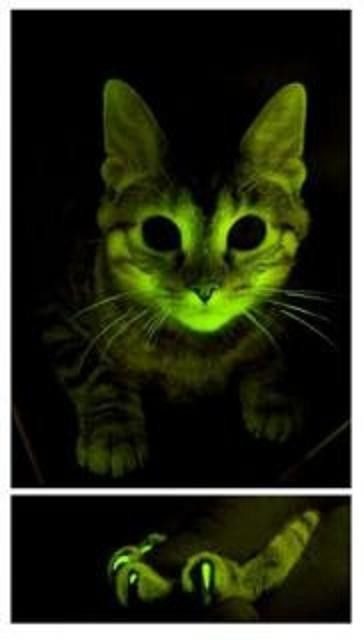'Green-Glowing' Cats May Help to Fight Against HIV/AIDS

Cats genetically modified to glow in the dark may give vital clues to the treatment of the AIDS virus, U.S. scientists have found.
Mayo Clinic researchers in the United States and at Yamaguchi University in Japan have developed a genome-based immunization strategy to fight feline-related AIDS, and illuminate ways to combat human AIDS and other diseases.
Feline immunodeficiency virus (FIV) causes AIDS in cats as the human immunodeficiency virus (HIV) does in people: by depleting the body's infection-fighting T-cells, USA Today reports.
One of the best things about this biomedical research is that it is aimed at benefiting both human and feline health, said Eric Poeschla, of the Mayo Clinic in Rochester, Minn., who led the study. It can help cats as much as people.
The new research, published Monday in Nature Methods, aimed to mimic the way evolution normally gives rise over vast time spans to protective protein versions.
As with HIV, the feline virus causes AIDS as well. The feline and human versions of key proteins that potently defend mammals against virus invasion are ineffective against FIV and HIV respectively because both viruses have evolved potent counter-weapons.
Researchers produced three glowing GM cats by using a virus to carry a gene, called green fluorescent protein, into the eggs from which the animals eventually grew.
The gene, which has its origins in jellyfish, expresses proteins that fluoresces when illuminated with certain frequencies of light.
And shining the UV light on the cats produced a green glow, confirming that the protein was being produced in their tissues and that the technique had worked, study authors noted.
The method of genetic modification is simpler and more efficient than traditional cloning techniques, and results in fewer animals being needed in the process.
This function is regularly used by scientists to monitor the activity of individual genes or cells in a wide variety of animals. The development and refinement of the gene technique earned its scientific pioneers the Nobel prize for chemistry in 2008.
HIV/AIDS has killed more than 30 million people and left countless children orphaned, with no effective vaccine on the horizon.
BBC News reports that Dr Poeschla's team has only tested cells taken from the animals and found they were resistant to FIV. But eventually they plan to expose the cats to the virus and see if they are protected.
© Copyright IBTimes 2024. All rights reserved.





















